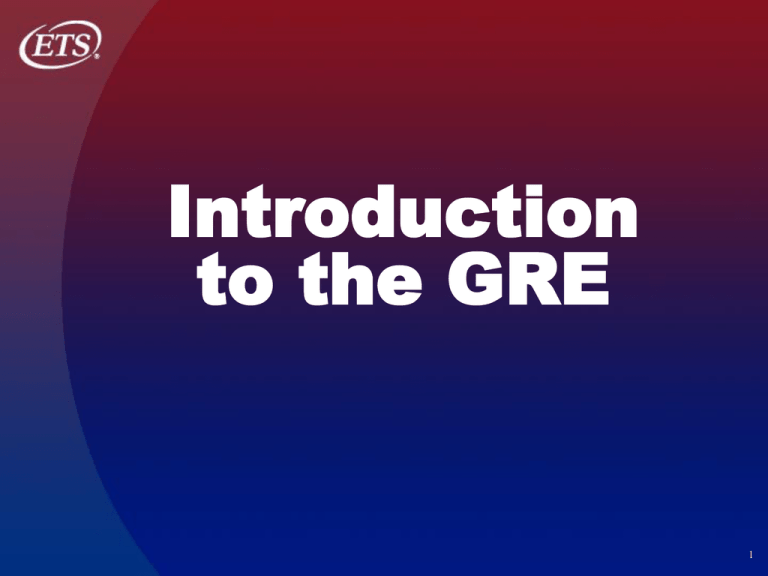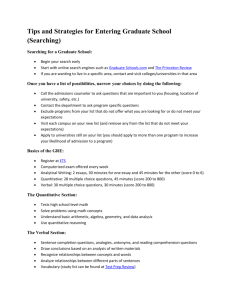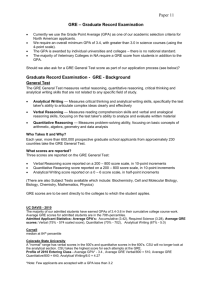
Introduction
to the GRE
1
GRE Testing Program
(Scores last 5 years)
I. The General Test
Verbal, Quantitative and Analytical Writing
Offered on computer 6 days/week
Limit once per calendar month, 5 times/year.
II. Subject Tests
Paper and pencil, offered 3 times/year
• Biochemistry, Cell &
Molecular Biology
• Biology
• Chemistry
• Computer Science
•
•
•
•
Literature in English
Mathematics
Physics
Psychology
2
GRE General Test Scores
(Aptitude Test )
Analytical
Writing:
• Score range:
0–6
• Mean:
4.1
Verbal and
Quantitative:
• Score Range:
200 – 800
• Verbal Mean:
465
• Quantitative Mean:
584
3
GRE Subject Test Scores
(Achievement Tests)
Possible Score Range: 200 – 990
• Actual score ranges vary by test
subject. See the website for score
distributions for your subject area.
4
Subject Test Registration
Test Date
• 10/9/10
• 11/13/10
• 4/9/11
Registration Deadline*
• 9/3/10
• 10/8/10
• 3/4/11
* Note this is a receipt date:
allow 7 days for mail.
5
How to Prepare for a
Subject Test
• Review the Subject Test practice booklet
for the test, which includes
– Content specifications for the test, including
the weight assigned to each topic
– Practice test
• The practice book will be mailed to you
when you register for the Subject Test,
free at www.ets.org/gre.
6
Registering for the GRE
• Call the test center directly and register by
phone to be sure the date you request is
available. You may also register on-line
or by mail.
• General test: $160
• Subject test: $140
• 4 reports free; $23 for each additional.
7
Copyright © Educational Testing Service, 2005. All rights reserved.
8
Fee Reductions
Those eligible for a limited number of 50% fee waivers
must be US citizens or resident aliens who are:
• enrolled in college on financial aid,
• dependents on parents’ taxes, whose parents contribute
no more than $1400/year to education, or
• independent and contributing personally no more than
$1800/year to education costs
• or an unenrolled college graduate whose Institutional
Student Information Report indicates self-supporting
status and a contribution of not more than $1,800.
Get a form at Financial Assistance Office; you must
register for GRE in writing.
9
The Computer-Adaptive
GRE General Test
Copyright © Educational Testing Service, 2005. All rights reserved.
10
ability / difficulty
Mean
score
0
1
2
3
4
5
6
7
8
number of questions answered
Copyright © Educational Testing Service, 2005. All rights reserved.
9
11
Copyright © Educational Testing Service, 2005. All rights reserved.
12
Copyright © Educational Testing Service, 2005. All rights reserved.
13
Copyright © Educational Testing Service, 2005. All rights reserved.
14
Copyright © Educational Testing Service, 2005. All rights reserved.
15
Copyright © Educational Testing Service, 2005. All rights reserved.
16
Copyright © Educational Testing Service, 2005. All rights reserved.
17
Copyright © Educational Testing Service, 2005. All rights reserved.
18
Copyright © Educational Testing Service, 2005. All rights reserved.
19
Copyright © Educational Testing Service, 2005. All rights reserved.
20
Copyright © Educational Testing Service, 2005. All rights reserved.
21
CBT Practical Advice:
1. Answer Questions
• You must answer each question in the
order it is presented.
• There’s no going back.
• Learn to identify the point at which it is
best to post a guess.
22
Answer Questions (continued)
• It is normal in computer adaptive testing
to answer several questions incorrectly,
even for high scorers.
[In 2008 HC student guessed on last 5 questions
of Quantitative and got 770.]
• Scores are based on the difficulty of the
questions you get right.
23
Practical Advice:
2. Timing
• There are no “time-outs” once a test
section has begun.
• Pacing is critical. Don’t leave questions
unanswered or finish with a string of
guesses.
• There is a penalty for unanswered
questions.
24
Overview of the Day
25
Prometric Centers or
Universities
•
•
•
•
•
•
Computer stations,
Other tests going on,
Security measures,
Demographic information,
Numbered scratch paper,
Clocks on computer.
26
The Analytical Writing
Measure
• Assesses critical thinking and analytical writing
skills, including the ability to:
– articulate complex ideas clearly
– examine claims and evidence
– support ideas with relevant reasons and
examples
– sustain a well-focused coherent discussion
– control the elements of standard written
English
27
The Analytical Writing
Measure
• “Present your Perspective on an Issue”
– You will be able to choose 1 of 2 essay topics.
– You will have 45 minutes to write your essay.
• “Analyze an Argument”
– You will have 30 minutes to critique a oneparagraph argument.
No spell-check or grammar-check is provided.
28
How the AWM is Scored
Each essay is scored by two trained readers, using a
6-point holistic scale; two scores that differ by more
than one point are adjudicated by a third reader.
Scores from the two readings of an essay are
averaged.
The final scores on the two essays are then averaged
and rounded up to the nearest half-point interval.
A single score is reported for the section.
Scoring guides and score level descriptions are
available on the GRE Web.
29
Preparing for the
Analytical Writing Measure
• All possible topics at www.ets.org/gre
• You can practice typing a timed essay using
GRE POWERPREP
• Get your essays scored at the Career Center
• ScoreitNow! Online Writing Practice for
machine scoring of your practice essay
30
Break
• Following the Analytical Writing
section, there is an optional 10minute break.
31
The Verbal Measure
• Knowledge of vocabulary words,
• Ability to use them in context, and
• Knowledge of the relationships between
words.
• Requires reading about topics and ideas in
the sciences, social sciences and
humanities, and answering questions
about them.
32
The Verbal Measure
You will have 30 questions
in 30 minutes:
• Antonyms
• Analogies
• Sentence completions
• Reading comprehension
(budget your time!)
All question types for all difficulty levels.
33
Preparing for the
Verbal Measure
34
Copyright © Educational Testing Service, 2005. All rights reserved.
35
Copyright © Educational Testing Service, 2005. All rights reserved.
36
37
38
39
40
41
42
43
44
45
46
47
48
49
Reading Comprehension
• The passage contains all information
necessary to answer questions, and
remains on screen throughout.
• Passages may be drawn from natural
sciences, social sciences or
humanities.
• On average, 2 short passages (2-3
questions); 1 long (4-5).
50
Two new question types
– Text completion, with 2 or 3 blanks
– Numeric Entry
• Test takers may see ONE new Verbal question or
ONE new Quantitative question on the test they
receive.
• Previous field trial results indicate questions are
functioning as intended.
• Questions will count toward scores as soon as an
adequate sample of data from the operational
testing environment is available.
• See sample questions and other information at
www.ets.org/gre/newquestiontypes.html.
51
Text Completions
52
53
54
The Quantitative Measure
You will have 28 questions in 45 minutes:
• A test of quantitative reasoning skills
• Key knowledge areas include basic
concepts and procedures related to
arithmetic, algebra, geometry, probability,
and statistics
55
Preparing for the
Quantitative Measure
56
57
Copyright © Educational Testing Service, 2005. All rights reserved.
58
59
60
61
Numeric Entry
The total amount of Judy’s water bill for the last
quarter of the year was $40.50. The bill consisted
of a fixed charge of $13.50 plus a charge of
$0.0075 per gallon for the water used in the
quarter. For how many gallons of water was Judy
charged for the quarter?
_____________ gallons
Click on the answer box and type in a number.
Backspace to erase.
62
Experimental Question Section
• Additional Verbal or Quantitative section
with questions in development for future
test administrations
• Experimental section may fall first, second
or third
• Treat all sections as if they count: you
can’t tell which two do and which one
doesn’t!
63
Keeping Your Scores
The test is geared toward your highest level
of difficulty, so you can’t judge accurately
how you did!
In general, if you finish the test, keep your
scores.
64
Timing your GRE
Preparation
65
Grad School Application Timeline
• Find application deadline for targeted
programs,
• Subtract one month to determine your
deadline,
• Subtract two more months to request
letters of recommendation,
• Take GRE at least two – three months
before published deadlines,
• Mail in application, and arrange for
transcripts to arrive by no later than one
month before deadline.
66
GRE Prep Timeline
• Take a pre-test to identify your
approximate beginning level
• Find target scores on PowerPrep
• Study areas that need improvement
• Practice to increase speed
• Take a post-test to track your
improvement
67
GRE Bottom Line:
Practice!!
68






